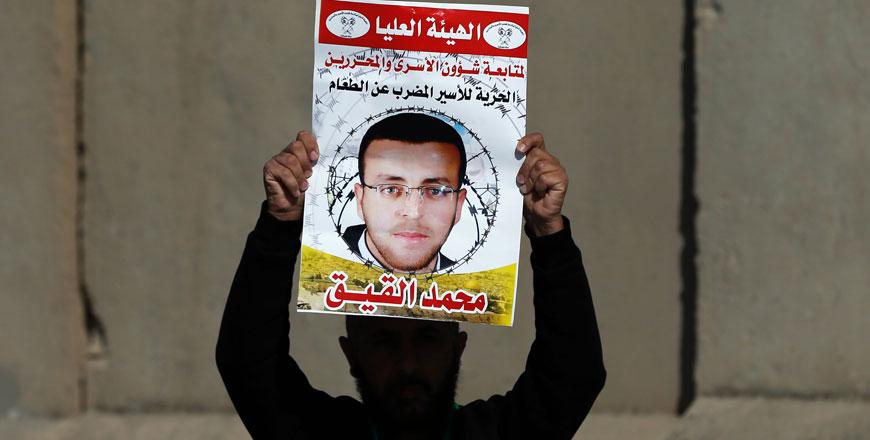You are here
Israel court rejects West Bank treatment for hunger striker
By AFP - Feb 15,2016 - Last updated at Feb 15,2016
OCCUPIED JERUSALEM — Israel's top court on Monday rejected a Palestinian hunger striker's request to be moved to the West Bank for treatment but said he could be transferred to occupied East Jerusalem.
The supreme court gave Mohammed Al Qiq until 10:00am on Tuesday to decide whether to agree to his transfer from hospital in northern Israel to Jerusalem's Palestinian-run Makassed Hospital.
The 33-year-old is reported to be close to death after 83 days on hunger strike in protest against his internment under Israel's administrative detention laws.
His internment was officially suspended on February 4, but he was still prevented from leaving hospital in Afula in northern Israel where he is handcuffed to his bed.
Qiq's lawyer has said his client will continue his fast "until he is freed", and demanded he be moved to his West Bank home city of Ramallah but the Israeli military prosecutor opposed the application.
A supreme court statement said it recommended the "transfer of the hunger striker to Makassed Hospital in East Jerusalem to continue his treatment".
It added the move was "in the framework of the frozen administrative measures concerning him", raising the possibility he could be detained again if he ends his hunger strike.
Qiq, a father of two and a correspondent for Saudi Arabia's Almajd TV network, was arrested at his home in Ramallah on November 21.
He has been refusing food since November 25 in protest against the "torture and ill treatment that he was subjected to during interrogation", according to Addameer, a Palestinian rights organisation.
The United Nations has expressed concern about his fate, with the International Committee of the Red Cross describing his condition as critical.
Israel's Shin Bet domestic security service says Qiq was detained for "terror activity" on behalf of the Islamist group Hamas, which controls the Gaza Strip.
Israel's controversial administrative detention law allows the state to hold suspects without trial for periods of six months which are renewable indefinitely.
Related Articles
DURA, Palestinian Territories — A Palestinian journalist held by Israel without trial, Mohammed Al Qiq, agreed Friday to end his 94-day hung
OCCUPIED JERUSALEM — Israel's supreme court said Tuesday a Palestinian hunger striker who has fasted over 80 days must stay in the northern
RAMALLAH — A Palestinian journalist on a two-month hunger strike in an Israeli jail could die at any minute, his lawyer warned on Monday.Moh

















